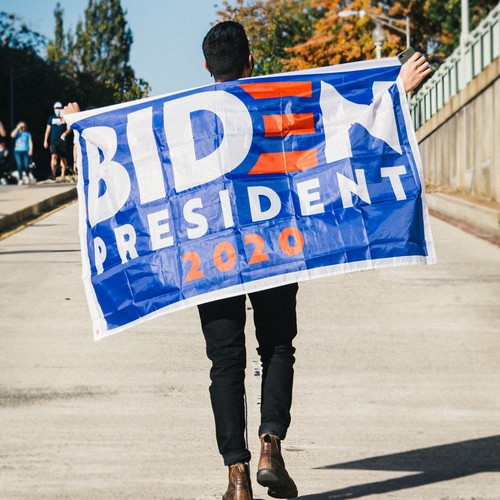Telefonica, Orange, Telus, SK Telecom, Rakuten, Taiwan Mobile, SoftBank and Optus were among the network operators that signed on to Trump's 'Clean Networks' program. Its fate is now unclear.

There are strong indications that former President Trump's international "Clean Networks" campaign – which sought to publicly rally countries and network operators against Chinese vendors – may not continue under President Biden.
However, that doesn't necessarily mean that Huawei and other Chinese companies have received a reprieve on the global stage.
"Technology is at the center of US-China competition. China has been willing to do whatever it takes to gain a technological advantage – stealing intellectual property, engaging in industrial espionage, and forcing technology transfer. We have to play a better defense, which must include holding China accountable for its unfair and illegal practices and making sure that American technologies aren't facilitating China's military buildup or human rights abuses," a State Department spokesperson wrote in response to questions from Light Reading. "President Biden is firmly committed to making sure that Chinese companies cannot misappropriate and misuse American data – and to ensuring that US technology does not support China's malign activities."
However, the spokesperson declined to answer direct questions about whether the department's "Clean Networks" campaign – launched in the waning months of Trump's term in office – will continue under Biden.
Importantly, the State Department's website touting the details of its Clean Networks effort, as well as the countries and companies that pledged to back it, has been relegated to an "archived" section that exactly coincides with Trump's four years in office.
The campaign sought to create a bright, public line between companies and countries that might use equipment from Chinese vendors and those that wouldn't. Telefonica, Orange, Telus, SK Telecom, Rakuten, Taiwan Mobile, SoftBank and Optus were among the network operators that signed on to the program.
Now, it's unclear exactly how Biden and his appointees might handle the "Clean Networks" campaign specifically and US-China relations in general.
"Let me just say that I also believe that President Trump was right in taking a tougher approach to China," Antony Blinken, Biden's nominee for secretary of state, said during his confirmation hearing, according to the Nikkei. "I disagree very much with the way that he went about it in a number of areas, but the basic principle was the right one, and I think that's actually helpful to our foreign policy."
The Senate confirmed Blinken as the head of the State Department in January by a vote of 78-22.
Blinken isn't the only Biden official offering tough talk on China. The State Department spokesperson pointed to recent comments from White House Press Secretary Jen Psaki that "telecommunications equipment, made by untrusted vendors, including Huawei, is a threat to the security of the US and our allies. We'll ensure that the American telecommunications networks do not use equipment from untrusted vendors, and we'll work with allies to secure their telecommunications networks and make investments to expand production of telecommunications equipment by trusted US and allied companies."
The spokesperson discussed China with Light Reading "on background," a common approach among US government officials. According to the State Department, "on background" means that the official's remarks "may be quoted directly or paraphrased and are attributed to a 'State Department official' or 'administration official,' as determined by the official."
The status of the State Department's "Clean Networks" campaign isn't the only Trump-era effort against Huawei that may not continue under President Biden. For example, Rhode Island Governor Gina Raimondo, Biden's nominee to lead the Commerce Department, has declined to firmly state whether Huawei will remain on the department's "entity list," which prevents US business with the Chinese vendor. However, she has said she has "no reason to believe that entities [including Huawei] on those lists should not be there."
Huawei, for its part, may be hoping for an opening with Biden following Trump's departure. "I would welcome [a call from Biden]" Huawei founder and CEO Ren Zhengfei said this week. "I would talk with him about common development. Both the US and China need to develop their economies, as this is good for our society and financial balance."
A softening in the US approach towards Huawei and China would be a mistake, according to some analysts and lawmakers. For example, nearly two dozen Republican lawmakers called on President Biden last month to firmly engage with allies on technologies like 5G, as Defense News reported.
Others agree.
"While far from perfect, at its heart the Clean Networks program is some of the first real coordinated action we've seen from the US government to secure supply chains, ensure the use of trusted vendors, and build consensus around what safe and trustworthy technology should look like," wrote Mary Brooks in January. Brooks is a senior research associate for cybersecurity and emerging threats with R Street Institute, a nonprofit, nonpartisan, public policy research organization that often comments on 5G policy issues.
"A reformed, revitalized Clean Networks is a key part of what must be a comprehensive strategy to protect the data of US citizens and allies and to promote US technological, economic and military strength into an era of 5G and beyond," Brooks continued.
Related posts:
— Mike Dano, Editorial Director, 5G & Mobile Strategies, Light Reading | @mikeddano
Read more about:
AsiaAbout the Author(s)
You May Also Like











